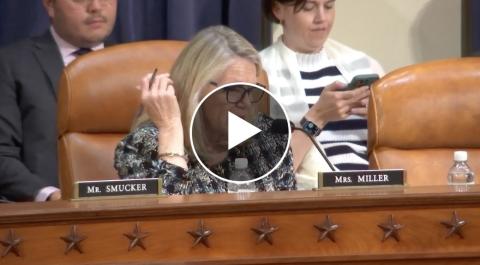Miller Participates in Ways and Means Trade Hearing on U.S. Trade Negotiation Priorities
Washington, D.C. – Today, Congresswoman Carol Miller (R-WV) participated in a Ways and Means Trade Subcommittee hearing to review the United States’ trade negotiation priorities in order to help further expand fair trade opportunities for U.S. businesses.

Congresswoman Miller began by reflecting on the United States’ need to strengthen trade relations in the Indo-Pacific to increase the U.S.’ standing within the region and deter China's global trade dominance.
“The Indo-Pacific is an essential strategic foothold to combat China’s quest for global economic dominance. The economies in the Indo-Pacific are rapidly developing. The growing personal wealth of the citizens in the Indo-Pacific provides more export opportunities. The advances in the region’s manufacturing sector enables us to diversify our supply chain away from China. Unfortunately, we are falling severely behind as China makes significant strides. While the United States has not concluded a single trade agreement with an Indo-Pacific partner in more than 10 years, China concluded negotiations with the Association of Southeast Asian Nations (ASEAN) to enhance their massive free trade area in October 2024. This is why I re-introduced the U.S. Trade Leadership in the Indo-Pacific Act with several of my colleagues on this committee. This bill will make significant inroads to further our partnerships in the region,” said Congresswoman Miller.
Congresswoman Miller asked Jonathan Root, the Chief Financial Officer and President of Commercial, Harley-Davidson, Inc. to share his thoughts on how the lack of trade in the Indo-Pacific region affects U.S. companies and how Congress should address this.
“Mr. Root, as you are aware, our lack of engagement in the Indo-Pacific has left the door open for these nations to stifle bilateral trade by imposing significant trade barriers on American products. This includes remarkably steep tariffs on Harley Davidson motorcycles. Could you speak to the importance of the Indo-Pacific as an export market? What can Congress do to overcome the barriers that are currently in place?” asked Congresswoman Miller.
“We certainly believe that Asia Pacific presents a significant opportunity over the mid-term and the long-term from a Harley-Davidson perspective. We recognize that there are unique trade pacts that are in place that certainly provide some benefit to those who manufacture within that region. Many of our competitor brands have plants in Thailand that certainly ensure low tariff access to those ASEAN markets. Many Asian nations' trade agreements allow exports from Thailand into those markets duty-free and that does provide a significant advantage for them and a disadvantage for direct exports from the U.S. into those markets. We obviously do ask for, again, a level playing field that gives American workers the ability to export their products with equal treatment,” responded Mr. Root.
Congresswoman Miller highlighted how U.S. digital companies are receiving unfair treatment from other countries when it comes to trade. She then asked Christine Bliss, the President of Coalition of Services Industries (CSI) what the U.S. should do to protect American companies.
“As we engage in these important trade negotiations, it is important we work to strengthen the emerging sectors of our economy, particularly in the digital services economy. President Trump and my colleagues on both sides of the aisle are keenly aware of the unfair treatment United States technology companies are facing, by even our closest allies, including Canada and South Korea. It is pertinent that we put a stop to this, and to ensure our future agreements adequately protect U.S. companies from harmful policies. Ms. Bliss, what provisions should we include in our future trade agreements to make sure that our digital and service companies are adequately shielded from unfair treatment?” asked Congresswoman Miller.
“I agree with you. It’s a very, very serious problem and I think, first and foremost, data flows underpin all digital and virtually all services trade. I would say that this is one very key element we need to see in all of our trade agreements. Secondly, we need to see a prohibition on data localization, which often is coupled with restrictions on data flows. Third, and perhaps most importantly, we need to see a strong non-discrimination provision, which really goes to the core of your question. Whether you’re looking at India in the case of the Indo-Pacific or you’re looking at [South] Korea, one of our closest allies, I think having a strong non-discrimination provision is absolutely essential that we include in our agreements. Particularly in [South] Korea where we are facing legislative proposals, regulatory proposals for discriminatory online platform regulation, I think it’s essential that that happened there, and also that we frankly are facing both in [South] Korea and China harassment of U.S. firms through unfair regulatory and enforcement actions. I would say those three provisions are probably very, very key in terms of negotiation and resolving those issues,” responded Ms. Bliss.
###